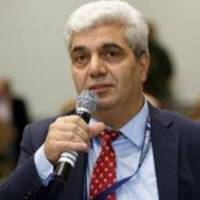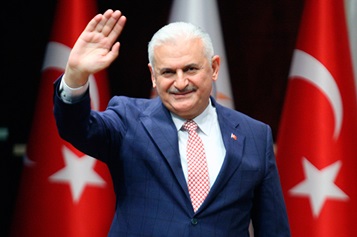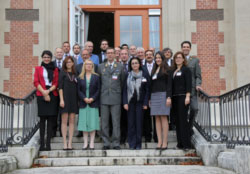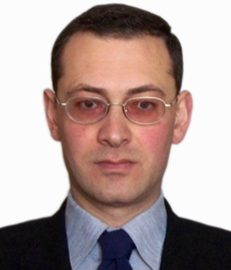Armenia’s U-turn back to ‘multi-vector foreign policy’  By Stepan Grigoryan, Head, Analytical Centre for Globalisation and Regional Cooperation, Armenia
By Stepan Grigoryan, Head, Analytical Centre for Globalisation and Regional Cooperation, Armenia
The statement from the President of Armenia in September 2013 sounded like a bolt from the blue. He would not sign the Association Agreement with the European Union at the planned November Eastern Partnership Summit in Vilnius, he said. Instead, Armenia would be joining the Russian led Eurasian Economic Union (EAEU). This signified Armenia's departure from a multi-vector foreign policy. READ MORE
- Wednesday, 17 January 2018, 09:54
Who Will Pay for Making America Great Again?
 Sergey Korol, Sergey Korol,
European Geopolitical Forum
American politics, in general, and its energy version in particular, resemble a chess game but according to the rules of American football.
The US plans to become a leading player in the world energy market do not coincide with the interests of other major players, including OPEC countries and Russia. READ MORE
- Friday, 18 August 2017, 05:29
Adjusting the EU's Geopolitical Posture in the Eastern Neighborhood  by George Vlad Niculescu, Head of Research, the European Geopolitical Forum
by George Vlad Niculescu, Head of Research, the European Geopolitical Forum
How could the EU best deal with a revisionist Russia who challenged the post-Cold War European security order, most notably in Ukraine and in Georgia? We should probably start from considering EU’s current strategic options in its Eastern Neighbourhood. The key question here is what should be the EU’s objective in this contested region? Is it to find a compromise solution with Moscow on how to fix the broken security order? Or is it to defend its shared values in the Eastern Neighbourhood, and to eventually annihilate the Russian power and influence? READ MORE
- Tuesday, 7 March 2017, 10:10
Turkey will reconcile with Syria

Prime Minister Binali Yildirim said that Turkey is heading to restore relations with Damascus. "We will expand our circle of friends. We have already begun to do so. We normalized our relations with Israel and Russia, and now, I am sure, we will do the same with Syria. We need it to be done", - said Yildirim, speaking on Turkish television. READ MORE
- Tuesday, 7 March 2017, 10:09
“Towards Europe?! Straddling Fault Lines and Choosing Sides in the South Caucasus” 10th Workshop of the PfP Consortium’s “Regional Stability in the South Caucasus” Study Group (RSSC SG)
 On 6-8 November, 2014, the PfPC and the Austrian National Defense Academy jointly organized the 10th Workshop of the RSSC SG at “Schloss Rothschild” in Reichenau (Austria). This workshop offered a platform for constructive dialogue among government and academic experts on the prospective roles of the EU and the Eurasian Economic Union (EEU) in breaking the current deadlocks in the resolution of the protracted conflicts in Abkhazia, South Ossetia and Nagorno-Karabakh. During this workshop, a panel moderated by George Niculescu, the Head of Research of EGF, examined the background and the potential implications from the perspectives of South Caucasus (SC) states of having to make undesirable choices between the EU and the EEU. The panelists’ presentations and the ensuing discussion highlighted that, against the backdrop of the Ukrainian crisis, maintaining freedom of choice on the ways and levels of engagement with both the EU and the EEU is a critical interest for each SC state, and a prerequisite for effective conflict resolution. In this context, Mr Niculescu thought that “the EU might work towards developing options for harmonizing the European and Eurasian integration normative systems. One of the options to be explored might involve sustaining post-conflict regional economic cooperation as a way to circumvent the dilemma of the states caught in-between competing European and Eurasian integration processes.” READ MORE. Please see the relevant post on Facebook here. On 6-8 November, 2014, the PfPC and the Austrian National Defense Academy jointly organized the 10th Workshop of the RSSC SG at “Schloss Rothschild” in Reichenau (Austria). This workshop offered a platform for constructive dialogue among government and academic experts on the prospective roles of the EU and the Eurasian Economic Union (EEU) in breaking the current deadlocks in the resolution of the protracted conflicts in Abkhazia, South Ossetia and Nagorno-Karabakh. During this workshop, a panel moderated by George Niculescu, the Head of Research of EGF, examined the background and the potential implications from the perspectives of South Caucasus (SC) states of having to make undesirable choices between the EU and the EEU. The panelists’ presentations and the ensuing discussion highlighted that, against the backdrop of the Ukrainian crisis, maintaining freedom of choice on the ways and levels of engagement with both the EU and the EEU is a critical interest for each SC state, and a prerequisite for effective conflict resolution. In this context, Mr Niculescu thought that “the EU might work towards developing options for harmonizing the European and Eurasian integration normative systems. One of the options to be explored might involve sustaining post-conflict regional economic cooperation as a way to circumvent the dilemma of the states caught in-between competing European and Eurasian integration processes.” READ MORE. Please see the relevant post on Facebook here.
- Friday, 20 February 2015, 18:32
Stakeholder Consultation Round Two - Exploring the Role of Economic Initiatives as Peace Building Tools in the Nagorno-Karabakh Context [UPDATED]
The second stakeholder consultation round in EGF's ongoing Nagorno-Karabakh research took place on 06-08 July 2014 in Berlin (Germany), including introduction of a post-conflict scenario building workshop. More than 30 experts from Armenia, Azerbaijan, and international partner NGOs and institutions attended this highly successful event, held in a constructive atmosphere of exchange. It has been the first step towards exploring the idea of a roadmap leading towards an economically integrated South Caucasus, and created a platform for exchange of information between Armenian and Azerbaijani experts. During the post-conflict scenario building workshop, regional participants simulated the negotiation of a roadmap for the implementation of economic components of a peace agreement built upon the Madrid principles, encompassing joint economic measures in areas such as energy, transport, trade, rehabilitation of the territories affected by the conflict, and the return of IDPs to their homeland.
Please click here for the summary of conclusions.
Please click here to see the agenda of the seminar, and participants’ biographies.
Please click here to see the EGF presentation on this research.
Russia Seeks Increased Control of Karabakh Resolution After Clashes Between Armenia and Azerbaijan*
 Armen Grigoryan, Armen Grigoryan,
EGF Guest Contributor
After the recent clashes between Armenian and Azerbaijani forces, Russia’s leadership attempts to act more decisively in order to compromise the OSCE Minsk Group mediation efforts and to compel Armenia and Azerbaijan to accept Russia’s special role in the region. Russia’s proximity and strong influence over political elites and societies gives it an advantage over other Minsk Group co-chairs – the U.S. and France. However, the lack of security guarantees and economic perspectives may induce Armenia to start reviewing its attitudes concerning relations with different international actors and regional integration frameworks. READ MORE
This article was first published by the "Central Asia-Caucasus Analyst, Central Asia-Caucasus Institute & Silk Road Studies Program Joint Center" which holds the copyright for it.”
- Tuesday, 25 November 2014, 20:55
Romania’s Energy Strategy Options: Current Trends in Eastern Europe’s Natural Gas Markets
 Dr Radu Dudau, Dr Radu Dudau,
director of the Energy Policy Group Bucharest (EGF Information Partner)
Romania’s most important foreign energy policy project, the Nabucco gas pipeline, collapsed in June 2013 as the rivaling TAP (Trans-Adriatic Pipeline) won the bidding for transporting Azerbaijani gas to the EU. Hence, the Southern Gas Corridor (SGC) will link the Caspian Basin to Southern Italy via Turkey, Greece, Albania, and the Adriatic Sea. Shah Deniz consortium’s choice was predominantly commercial, yet it came to the detriment of Eastern Europe’s strategic necessities. But, although left with no large scale international project, Romania keeps significant options to improve its energy security on the medium term. This paper reviews Romania’s prospective new sources –internal and external – of primary energy. READ MORE
- Tuesday, 25 November 2014, 20:54
|
|